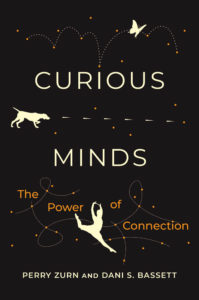In a new book ‘Curious Minds: The Power of Connection,’ Penn’s Dani S. Bassett and twin sibling Perry Zurn weave together history, linguistics, network science, neuroscience, and philosophy to unpack the concept of curiosity.
The following text is an excerpt from “Curious Minds: The Power of Connection” by Perry Zurn and Dani S. Bassett, © 2022 Massachusetts Institute of Technology.

Bugs. Sometimes, something just bugs you. A worm in your ear. We have all had the experience. You are going about your day, and something prompts you to wonder. You mull it over. You try on this explanation, or that one. And then you get distracted, and you move on. Or maybe you don’t, and the worm digs in deeper. Or maybe you do, but the worm returns to its wriggling later that night. You can’t shake it off. Maybe you pull out your phone or strike a few keys—or turn to a colleague or ping a friend. Gosh, now you really want to know! Perhaps you hit a few walls—paywalls or prejudices, differences of opinion or the limits of science, or even congenial scoffing at your pet project. Depending on who you are, you might also encounter outright sexism or racism, classism or ableism—all ways of telling you your bug is a bust. Forget this fleeting interest and focus on something that matters.
Regardless, let’s say, you carry on. Maybe the kids are screaming, or you are in a meeting, or you drive to the store for milk. Despite bombastic blasts from every corner, you hold on to what’s bugging you, refusing to let it bugger off. And then it happens … your mind begins to dance and to weave. Collecting the bits of things that might be relevant and stitching them together. So builds the briefest of webs. Perhaps it was a silkworm after all! Now you are really getting somewhere. This is your brain on curiosity.

And you are in good company. Rewind back to 1928, if you will. Virginia Woolf is sitting on the banks of a river (the Thames, the Cam, the Isis), and she has a worm in her ear: women and fiction. What even are they? she wonders. “Questions,” she calls them, “unsolved problems.” She finds herself walking and thinking, calmly at first and then feverishly. Crisscrossing the Brontë sisters and George Eliot, Charles Lamb and William Thackeray, she wonders not only about women and about fiction, but about their relation and the several ways in which it can be characterized. She strides by the nearby university, a place filled—as she puts it—with obsolete old minds, bereft of body and free of fact, loosed from the roughshod rambling toward truth she is currently undertaking. And then there it is!
Thought—to call it by a prouder name than it deserved—had let its line down into the stream. It swayed, minute after minute, hither and thither, among the reflections and the weeds, letting the water lift it and sink it, until—you know the little tug—the sudden conglomeration of an idea at the end of one’s line….
Read the full excerpt in Penn Today.
Dani S. Bassett is the J. Peter Skirkanich Professor at the University of Pennsylvania with a primary appointment in the School of Engineering and Applied Science’s Department of Bioengineering and secondary appointments in the School of Arts & Sciences’ Department of Physics & Astronomy, SEAS’ Department of Electrical and Systems Engineering, and the Perelman School of Medicine’s Departments of Neurology and Psychiatry.
Perry Zurn is an associate professor and director of undergraduate studies in philosophy at American University in the College of Arts and Sciences’ Department of Philosophy and Religion.
